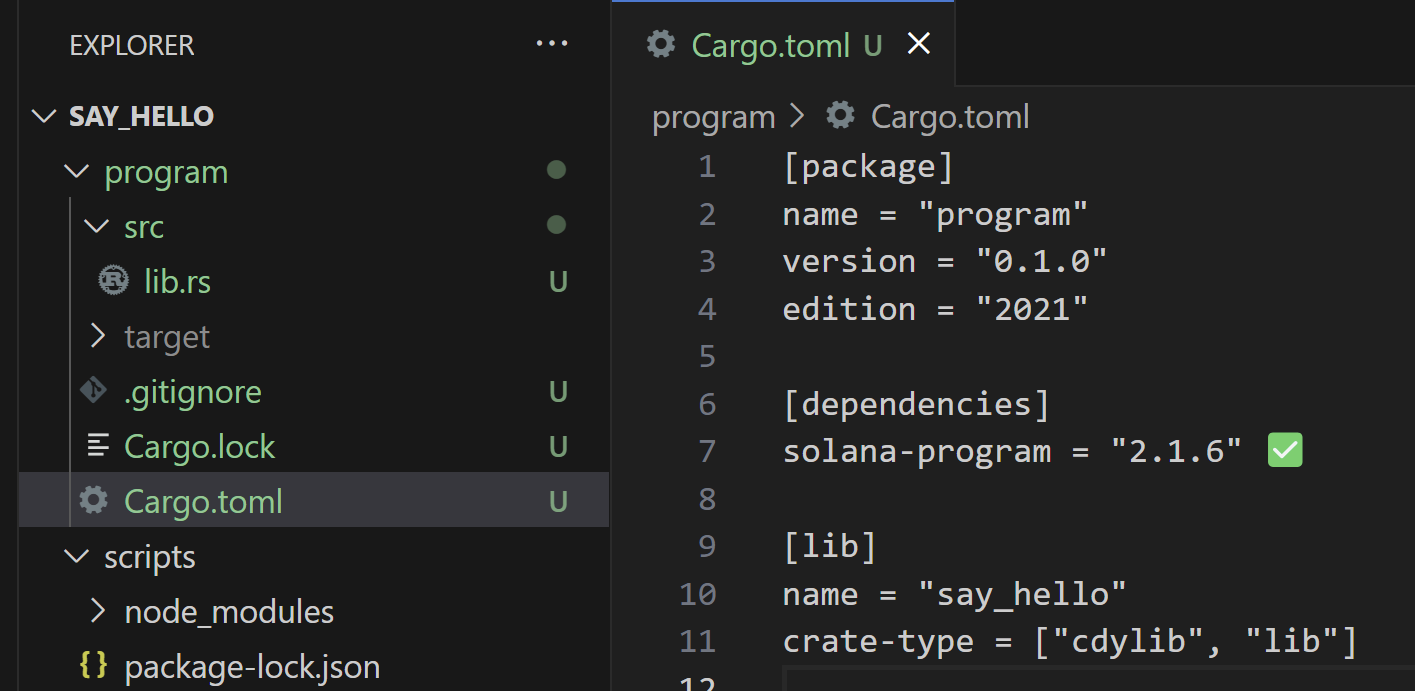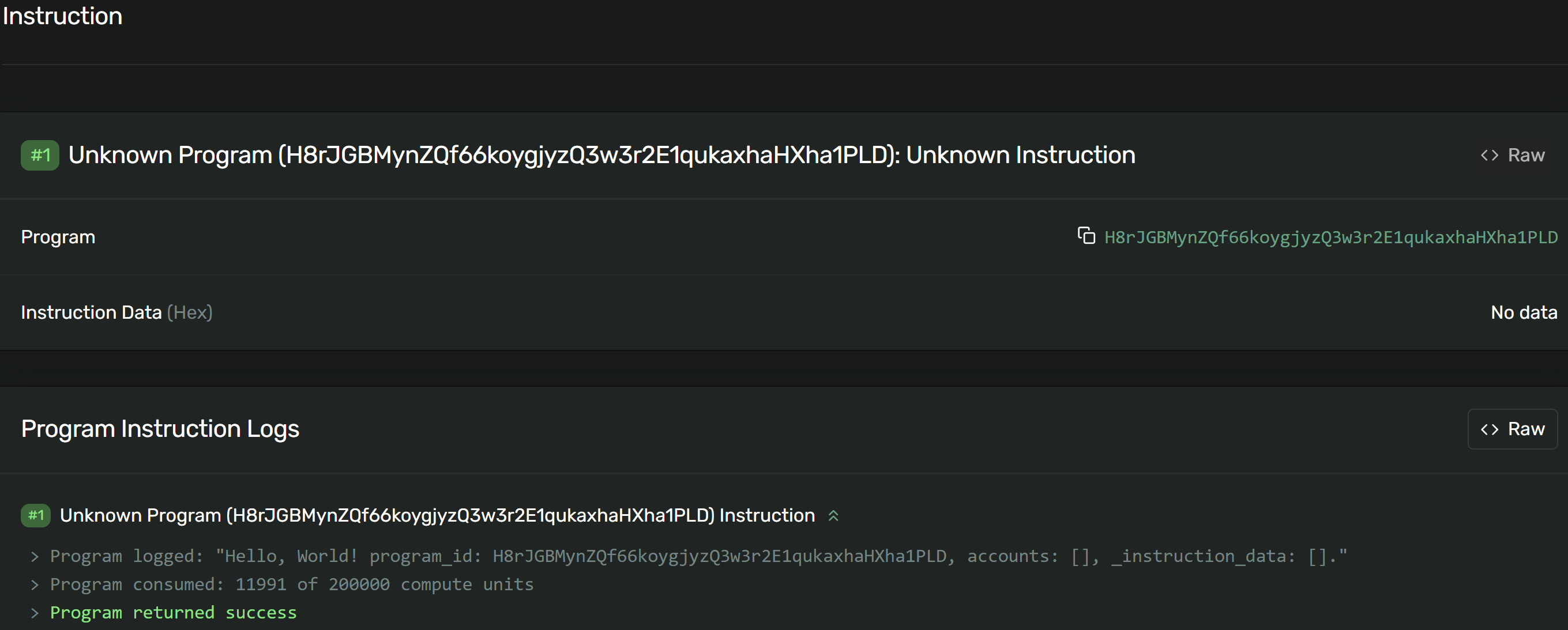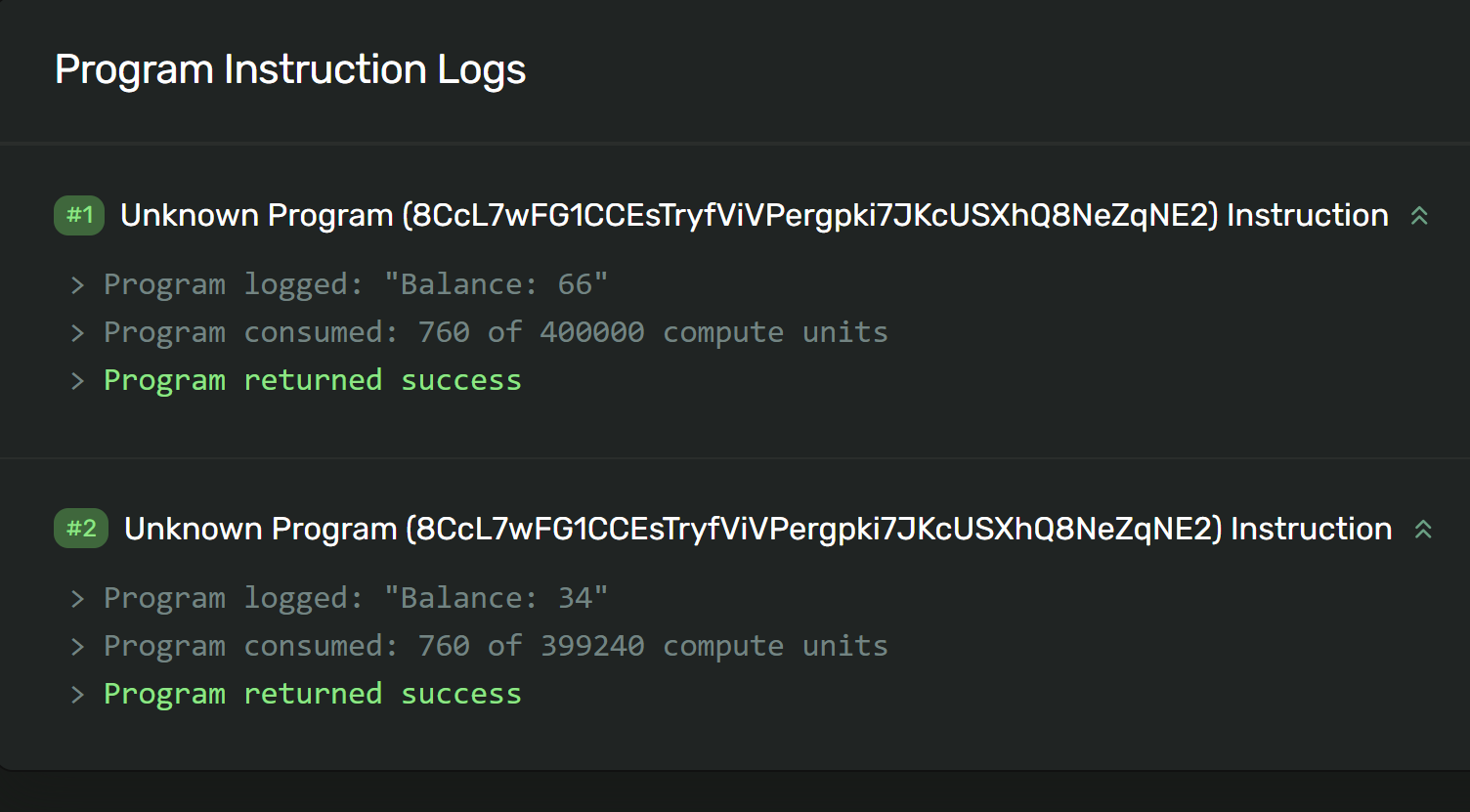Solana合约开发:从原生到Anchor
20 Dec 2024如果你和我一样是一名以太坊开发者,那么在尝试开发 Solana 时,你一定和我当初一样感到困惑。Solana 是如此不同且独特。在这篇文章中,我将向你展示一份精心设计的路线图,帮助你尽快开始在 Solana 上进行开发。
在开始之前,我假设你已经对 Solana 有一些基础知识,包括它的账户模型和程序系统,以及对 Rust 编程语言的基本了解。如果你对这些内容不是很熟悉也没关系,只要有基础理解,这篇文章就足够了。
此外,我假设你使用的是 Linux 系统,并且已经安装了 rust、solana-cli 和 anchor。如果你是 Windows 用户,我强烈推荐使用 WSL2,因为 anchor 对 Windows 的支持不是很好。
Hello Solana
对于初学者来说,直接深入一个像 Anchor 这样复杂的框架并不是一个好主意。这就是为什么当程序员尝试进入一个新领域时,我们总是从一个 HelloWorld 示例开始。
1.创建一个文件夹并使用 cargo 进行初始化
cargo init --lib program
2.添加依赖项
cd program
cargo add solana-program
3.将以下代码追加到 Cargo.toml 文件中
[lib]
name = "say_hello"
crate-type = ["cdylib", "lib"]

4.将代码添加到 lib.rs 文件
use solana_program::{
account_info::AccountInfo,
entrypoint,
entrypoint::ProgramResult,
msg,
pubkey::Pubkey,
};
entrypoint!(process_instruction);
fn process_instruction(
program_id: &Pubkey,
accounts: &[AccountInfo],
_instruction_data: &[u8],
) -> ProgramResult {
msg!("Hello, World! program_id: {:?}, accounts: {:?}, _instruction_data: {:?}.", program_id, accounts, _instruction_data);
Ok(())
}
如果你对 Rust 不是很熟悉,那也没关系。你只需要知道 process_instruction 是一个函数,它是整个程序的入口点。在这个函数中,我们使用 msg! 宏打印了一条消息。就是这么简单。
5.编译
cargo build-sbf
我们使用 cargo build-sbf 而不是 cargo build,因为 Solana 只接受 BPF 字节码。 你会在 program/target/deploy/ 文件夹中得到你的 .so 文件。
6.部署
solana program deploy ./target/deploy/say_hello.so
预期的输出如下:
Program Id: H8rJGBMynZQf66koygjyzQ3w3r2E1qukaxhaHXha1PLD
Signature: 5Lm5SEfkeepuS2y3VLJg5LvXk75zMZ2uJa9ksfcNUA14b5FyvgjHCSxWzhu9HT9Xk6SYnJTkPj3ozGm6iCFsAFa9
如果你没有更改 Solana CLI 的网络配置,你可能已经连接到了 devnet。你可以通过运行 solana config get 来确认你的网络配置。如果你连接的是 devnet,请记得领取一些测试用的 SOL。
现在我们已经在 Solana 上部署了我们的第一个程序!
与 Solidity 不同,Solana 程序没有构造函数。这意味着当我们在 Solana 上部署程序时,程序内部不会自动执行任何代码。
7.使用 Node.js 调用 Solana 程序
创建另一个文件夹,例如 scripts,使用 npm init 初始化该文件夹,然后安装依赖包:
npm install @solana/web3.js@1 @solana-developers/helpers@2
创建一个 .js 文件,例如 invoke.js。
import {
Connection,
PublicKey,
Transaction,
TransactionInstruction,
} from "@solana/web3.js";
import { getKeypairFromFile } from "@solana-developers/helpers";
const programId = new PublicKey("H8rJGBMynZQf66koygjyzQ3w3r2E1qukaxhaHXha1PLD");
// Connect to a solana cluster. Either to your local test validator or to devnet
const connection = new Connection("https://api.devnet.solana.com", "confirmed");
//const connection = new Connection("https://api.devnet.solana.com", "confirmed");
// We load the keypair that we created in a previous step
const keyPair = await getKeypairFromFile("~/.config/solana/id.json");
// Every transaction requires a blockhash
const blockhashInfo = await connection.getLatestBlockhash();
// Create a new transaction
const tx = new Transaction({
...blockhashInfo,
});
// Add our Hello World instruction
tx.add(
new TransactionInstruction({
programId: programId,
keys: [],
data: Buffer.from([]),
}),
);
// Sign the transaction with your previously created keypair
tx.sign(keyPair);
// Send the transaction to the Solana network
const txHash = await connection.sendRawTransaction(tx.serialize());
console.log("Transaction sent with hash:", txHash);
await connection.confirmTransaction({
blockhash: blockhashInfo.blockhash,
lastValidBlockHeight: blockhashInfo.lastValidBlockHeight,
signature: txHash,
});
console.log(
`Congratulations! Look at your ‘Hello World' transaction in the Solana Explorer:
https://explorer.solana.com/tx/${txHash}?cluster=devnet`,
);
不要忘记将 programId 替换为你的程序 ID。 然后我们可以使用 invoke.js 调用 Solana 程序:
node ./invoke.js
输出应如下所示:
(node:630) [MODULE_TYPELESS_PACKAGE_JSON] Warning: Module type of file:///mnt/d/code/test/hello_solana/say_hello/scripts/test.js is not specified and it doesn't parse as CommonJS.
Reparsing as ES module because module syntax was detected. This incurs a performance overhead.
To eliminate this warning, add "type": "module" to /mnt/d/code/test/hello_solana/say_hello/scripts/package.json.
(Use `node --trace-warnings ...` to show where the warning was created)
(node:630) [DEP0040] DeprecationWarning: The `punycode` module is deprecated. Please use a userland alternative instead.
Transaction sent with hash: k5yg4WzUnHjmX7B2VxLEbUYMY5k2dgrUy4oGmzCEX6LGKzr4EatmdXd26c3hkB1nhFoFa4cv5PkHrhMzV3xB16a
Congratulations! Look at your ‘Hello World' transaction in the Solana Explorer:
https://explorer.solana.com/tx/k5yg4WzUnHjmX7B2VxLEbUYMY5k2dgrUy4oGmzCEX6LGKzr4EatmdXd26c3hkB1nhFoFa4cv5PkHrhMzV3xB16a?cluster=devnet
我们可以使用 Solana Explorer 跟踪此交易:

就是这样!我们已经成功调用了我们在 Solana 上的程序!
使用原生程序创建代币
现在我们已经了解了如何在 Solana 上部署和调用程序,是时候在 Solana 上创建我们自己的代币了!
一个代币应该支持铸造(minting)、转账(transferring)以及查询账户余额(retrieving the balance)。让我们开始!
use borsh::{BorshDeserialize, BorshSerialize};
use solana_program::{
account_info::{next_account_info, AccountInfo},
entrypoint,
entrypoint::ProgramResult,
msg,
program_error::ProgramError,
pubkey::Pubkey,
system_instruction,
sysvar::rent::Rent,
program::invoke_signed,
borsh1::try_from_slice_unchecked,
};
#[derive(BorshSerialize, BorshDeserialize, Debug) ]
pub struct TokenMint {
pub is_initialized: bool,
pub total_supply: u64,
pub mint_authority: Pubkey,
}
#[derive(BorshSerialize, BorshDeserialize, Debug)]
pub struct TokenAccount {
pub is_initialized: bool,
pub owner: Pubkey,
pub balance: u64,
}
#[derive(BorshSerialize, BorshDeserialize, Debug)]
pub enum TokenInstruction {
InitializeMint,
Mint { amount: u64 },
Transfer { amount: u64 },
Balance,
}
entrypoint!(process_instruction);
pub fn process_instruction(
program_id: &Pubkey,
accounts: &[AccountInfo],
instruction_data: &[u8],
) -> ProgramResult {
let instruction = TokenInstruction::try_from_slice(instruction_data)
.map_err(|_| ProgramError::InvalidInstructionData)?;
match instruction {
TokenInstruction::InitializeMint => {
initialize_mint(program_id, accounts)
},
TokenInstruction::Mint { amount } => {
mint_tokens(program_id, accounts, amount)
},
TokenInstruction::Transfer { amount } => {
transfer_tokens(program_id, accounts, amount)
},
TokenInstruction::Balance => {
get_balance(program_id, accounts)
}
}
}
fn initialize_mint(
program_id: &Pubkey,
accounts: &[AccountInfo],
) -> ProgramResult {
let accounts_iter = &mut accounts.iter();
let mint_account = next_account_info(accounts_iter)?;
let authority_account = next_account_info(accounts_iter)?;
let deployer_account = "2FAqSMicn8Wuxe3beYNdqk6ApKrXuhCGyHndQaqCdhzT";
// authority_account should equal the deployer_account of the program.
// Just like the OnerOnly modifier in Solidity.
// But there's no convenient way to get the deployer account directly in Solana program so we have to hardcode it.
if authority_account.key.to_string() != deployer_account {
return Err(ProgramError::InvalidAccountData);
}
if authority_account.is_signer == false {
return Err(ProgramError::MissingRequiredSignature);
}
if mint_account.data_is_empty() == false {
return Err(ProgramError::AccountAlreadyInitialized);
}
// Solana force to provide every account in the instruction data(accounts array)
// The invoker of initialize_mint must get the mint account address by calling the find_program_address method with same seeds
let (mint_account_addr, bump_seed) = Pubkey::find_program_address(&[b"mint"], program_id);
if mint_account_addr != *mint_account.key {
return Err(ProgramError::InvalidAccountData);
}
// Create the mint account
let space = std::mem::size_of::<TokenMint>();
let lamports = Rent::default().minimum_balance(space);
invoke_signed(
&system_instruction::create_account(
authority_account.key,
mint_account.key,
lamports,
space as u64,
program_id,
),
&[authority_account.clone(), mint_account.clone()],
&[&[&b"mint"[..], &[bump_seed]]],
)?;
// Initialize the mint account data
let mint_account_data = TokenMint {
is_initialized: true,
total_supply : 0,
mint_authority: *authority_account.key,
};
// Serialize and save the mint data to mint account
mint_account_data.serialize(&mut &mut mint_account.data.borrow_mut()[..])?;
msg!("Mint account created and initialized successfully. size: {}, data: {:?}", space, mint_account.data);
Ok(())
}
fn mint_tokens(
program_id: &Pubkey,
accounts: &[AccountInfo],
amount: u64,
) -> ProgramResult {
let accounts_iter = &mut accounts.iter();
let mint_account = next_account_info(accounts_iter)?;
let destination_wallet_account = next_account_info(accounts_iter)?;
let destination_token_account = next_account_info(accounts_iter)?;
let authority_account = next_account_info(accounts_iter)?;
// Only the mint_authority can mint tokens
if authority_account.is_signer == false {
return Err(ProgramError::MissingRequiredSignature);
}
if mint_account.data_is_empty() {
return Err(ProgramError::UninitializedAccount);
}
let mut mint_data: TokenMint = try_from_slice_unchecked::<TokenMint>(&mint_account.data.borrow())?;
if mint_data.mint_authority != *authority_account.key {
return Err(ProgramError::MissingRequiredSignature);
}
// If the destination_token_account is not initialized, create and initialize it
if destination_token_account.data_is_empty() {
let (token_account_addr, bump_seed) = Pubkey::find_program_address(
&[mint_account.key.as_ref(), destination_wallet_account.key.as_ref()],
program_id,
);
if token_account_addr != *destination_token_account.key {
return Err(ProgramError::InvalidAccountData);
}
let space = std::mem::size_of::<TokenAccount>();
let lamports = Rent::default().minimum_balance(space);
invoke_signed(
&system_instruction::create_account(
authority_account.key,
destination_token_account.key,
lamports,
space as u64,
program_id,
),
&[authority_account.clone(), destination_token_account.clone()],
&[&[&mint_account.key.to_bytes(), &destination_wallet_account.key.to_bytes(), &[bump_seed]]],
)?;
let token_account_data = TokenAccount {
is_initialized: true,
owner: *destination_wallet_account.key,
balance: 0,
};
token_account_data.serialize(&mut &mut destination_token_account.data.borrow_mut()[..])?;
}
let mut token_account_data = try_from_slice_unchecked::<TokenAccount>(&destination_token_account.data.borrow())?;
token_account_data.balance += amount;
mint_data.total_supply += amount;
token_account_data.serialize(&mut &mut destination_token_account.data.borrow_mut()[..])?;
mint_data.serialize(&mut &mut mint_account.data.borrow_mut()[..])?;
msg!("Tokens minted successfully.");
Ok(())
}
fn transfer_tokens(
program_id: &Pubkey,
accounts: &[AccountInfo],
amount: u64,
) -> ProgramResult {
let accounts_iter = &mut accounts.iter();
let mint_account = next_account_info(accounts_iter)?;
let source_wallet_account = next_account_info(accounts_iter)?;
let source_token_account = next_account_info(accounts_iter)?;
let destination_wallet_account = next_account_info(accounts_iter)?;
let destination_token_account = next_account_info(accounts_iter)?;
if source_wallet_account.is_signer == false {
return Err(ProgramError::MissingRequiredSignature);
}
if mint_account.data_is_empty() {
return Err(ProgramError::UninitializedAccount);
}
if source_token_account.data_is_empty() {
return Err(ProgramError::InvalidAccountData);
}
let mut source_data = try_from_slice_unchecked::<TokenAccount>(&source_token_account.data.borrow())?;
if source_data.balance < amount {
return Err(ProgramError::InsufficientFunds);
}
// If the destination_token_account is not initialized, create and initialize it
if destination_token_account.data_is_empty() {
let (destination_token_account_addr, bump_seed) = Pubkey::find_program_address(
&[mint_account.key.as_ref(), destination_wallet_account.key.as_ref()],
program_id,
);
if destination_token_account_addr != *destination_token_account.key {
return Err(ProgramError::InvalidAccountData);
}
let space = std::mem::size_of::<TokenAccount>();
let lamports = Rent::default().minimum_balance(space);
invoke_signed(
&system_instruction::create_account(
source_wallet_account.key,
destination_token_account.key,
lamports,
space as u64,
program_id,
),
&[source_wallet_account.clone(), destination_token_account.clone()],
&[&[&mint_account.key.to_bytes(), &destination_wallet_account.key.to_bytes(), &[bump_seed]]],
)?;
let destination_data = TokenAccount {
is_initialized: true,
owner: *destination_wallet_account.key,
balance: 0,
};
destination_data.serialize(&mut &mut destination_token_account.data.borrow_mut()[..])?;
}
let mut destination_data = try_from_slice_unchecked::<TokenAccount>(&destination_token_account.data.borrow())?;
source_data.balance -= amount;
destination_data.balance += amount;
source_data.serialize(&mut &mut source_token_account.data.borrow_mut()[..])?;
destination_data.serialize(&mut &mut destination_token_account.data.borrow_mut()[..])?;
msg!("Tokens transferred successfully.");
Ok(())
}
fn get_balance(_program_id: &Pubkey, accounts: &[AccountInfo]) -> ProgramResult {
let accounts_iter = &mut accounts.iter();
let token_account = next_account_info(accounts_iter)?;
// If the token_account is not initialized, that means user never holds this token
if token_account.data_is_empty() {
msg!("Balance: 0");
return Ok(());
}
let account_data = try_from_slice_unchecked::<TokenAccount>(&token_account.data.borrow())?;
msg!("Balance: {}", account_data.balance);
Ok(())
}
使用 cargo build-sbf 编译上述代码,然后使用 solana program deploy ./target/deploy/your_archive_name.so 部署 .so 文件。
接下来是该程序的客户端应用程序:
import {
Connection,
PublicKey,
Keypair,
Transaction,
TransactionInstruction,
SystemProgram,
sendAndConfirmTransaction,
Enum
} from "@solana/web3.js";
import { getKeypairFromFile } from "@solana-developers/helpers";
import * as borsh from 'borsh';
// Main program ID of your deployed program
const programId = new PublicKey("8CcL7wFG1CCEsTryfViVPergpki7JKcUSXhQ8NeZqNE2");
const [mintAccountAddress, bump] = PublicKey.findProgramAddressSync(
[Buffer.from("mint")],
programId
);
console.log("Mint account:", mintAccountAddress.toBase58());
async function main() {
// Setup connection and accounts
const connection = new Connection("https://api.devnet.solana.com", "confirmed");
// We load the keypair from local file
const payer = await getKeypairFromFile("~/.config/solana/id.json");
console.log("Initialize mint account...");
{
// Generate new keypairs to create a data account used for storing the total supply stuff, aka mint account
const instructionData = Buffer.alloc(1);
instructionData.writeUInt8(0, 0);
console.log("Init Mint Instruction data:", instructionData);
const transaction = new Transaction().add(
new TransactionInstruction({
keys: [
{ pubkey: mintAccountAddress, isSigner: false, isWritable: true },
{ pubkey: payer.publicKey, isSigner: true, isWritable: false },
{ pubkey: SystemProgram.programId, isSigner: false, isWritable: false },
],
programId: programId,
data: instructionData,
})
);
await sendAndConfirmTransaction(connection, transaction, [payer]);
}
console.log("Minting tokens...");
{
// Generate new keypairs to create a data account used for storing the balance of current user, aka token account
// If a user holds 100 kinds of tokens, then he has 100 token accounts
const destinationWalletAddress = new PublicKey("2FAqSMicn8Wuxe3beYNdqk6ApKrXuhCGyHndQaqCdhzT");
const [destinationTokenAddress, bump] = PublicKey.findProgramAddressSync(
[mintAccountAddress.toBuffer(), destinationWalletAddress.toBuffer()],
programId
);
console.log("Destination token account:", destinationTokenAddress.toBase58());
const instructionData = Buffer.alloc(1 + 8);
instructionData.writeUInt8(1, 0);
instructionData.writeBigUInt64LE(BigInt(100), 1);
console.log("Mint Instruction data", instructionData);
const transaction = new Transaction().add(
new TransactionInstruction({
keys: [
{ pubkey: mintAccountAddress, isSigner: false, isWritable: true },
{ pubkey: destinationWalletAddress, isSigner: false, isWritable: false },
{ pubkey: destinationTokenAddress, isSigner: false, isWritable: true },
{ pubkey: payer.publicKey, isSigner: true, isWritable: false },
{ pubkey: SystemProgram.programId, isSigner: false, isWritable: false },
],
programId: programId,
data: instructionData,
})
);
await sendAndConfirmTransaction(connection, transaction, [payer]);
}
console.log("Transferring tokens...");
{
const instructionData = Buffer.alloc(1 + 8);
instructionData.writeUInt8(2, 0);
instructionData.writeBigUInt64LE(BigInt(34), 1);
console.log("Transfer Instruction data", instructionData);
const sourceWalletAddress = new PublicKey("2FAqSMicn8Wuxe3beYNdqk6ApKrXuhCGyHndQaqCdhzT");
const [sourceTokenAddress, bump_source] = PublicKey.findProgramAddressSync(
[mintAccountAddress.toBuffer(), sourceWalletAddress.toBuffer()],
programId
);
const destinationWalletAddress= new PublicKey("3VW79TUVeb5wpC8NhqrqyuUekdJyncfEfoxeMwqJuJyb");
const [destinationTokenAddress, bump_dest] = PublicKey.findProgramAddressSync(
[mintAccountAddress.toBuffer(), destinationWalletAddress.toBuffer()],
programId
);
console.log("Source token account:", sourceTokenAddress.toBase58());
console.log("Destination token account:", destinationTokenAddress.toBase58());
const transaction = new Transaction().add(
new TransactionInstruction({
keys: [
{ pubkey: mintAccountAddress, isSigner: false, isWritable: true },
{ pubkey: sourceWalletAddress, isSigner: true, isWritable: false },
{ pubkey: sourceTokenAddress, isSigner: false, isWritable: true },
{ pubkey: destinationWalletAddress, isSigner: false, isWritable: false },
{ pubkey: destinationTokenAddress, isSigner: false, isWritable: true },
{ pubkey: SystemProgram.programId, isSigner: false, isWritable: false },
],
programId: programId,
data: instructionData,
})
);
await sendAndConfirmTransaction(connection, transaction, [payer]);
}
console.log("Getting balance...");
{
const instructionData = Buffer.alloc(1);
instructionData.writeUInt8(3, 0);
const walletAddressA = new PublicKey("2FAqSMicn8Wuxe3beYNdqk6ApKrXuhCGyHndQaqCdhzT");
const [tokenAddressA, bump_a] = PublicKey.findProgramAddressSync(
[mintAccountAddress.toBuffer(), walletAddressA.toBuffer()],
programId
);
const walletAddressB = new PublicKey("3VW79TUVeb5wpC8NhqrqyuUekdJyncfEfoxeMwqJuJyb");
const [tokenAddressB, bump_b] = PublicKey.findProgramAddressSync(
[mintAccountAddress.toBuffer(), walletAddressB.toBuffer()],
programId
);
const transaction = new Transaction();
transaction.add(
new TransactionInstruction({
keys: [{ pubkey: tokenAddressA, isSigner: false, isWritable: false }],
programId: programId,
data: instructionData,
})
);
transaction.add(
new TransactionInstruction({
keys: [{ pubkey: tokenAddressB, isSigner: false, isWritable: false }],
programId: programId,
data: instructionData,
})
);
const signature = await sendAndConfirmTransaction(connection, transaction, [payer]);
console.log("Balance transaction signature:", signature);
}
}
main().catch(console.error);
使用 node ./<your_js_file_name>.js 运行 JavaScript 文件,在运行之前将 programId 和测试账户替换为你自己的值。根据测试代码,两个账户的最终余额分别为 66 和 34。

在回顾 Rust 程序和 Node.js 客户端代码后,你可能会注意到,即使是一个简单的代币实现,过程也相当繁琐。
在 Rust(程序)中需要处理的复杂性:
- 程序本质上是一个指令处理器。如果我们想支持多种指令,需要使用枚举(enums),并通过 switch 或 match 语句进行处理。
- 与 Solidity 的映射(mappings)不同,Solana 程序将数据(例如余额)存储在单独的账户中。我们必须手动管理这些账户,包括创建账户、保存数据以及从账户中读取数据。
- 在保存和读取数据时,我们需要在 Rust 和 Node.js 中手动处理序列化和反序列化,必须深入参与(反)序列化的细节。
- 我们需要通过多个条件守卫(guard clauses)手动验证账户的权限和状态。
在 Node.js(客户端)中需要处理的复杂性:
- 手动且仔细地序列化指令数据,相信我,这可能会是一场灾难。
- 管理指令中涉及的每个账户,包括 PDAs(程序派生账户)。在 JavaScript(JS)代码和 Rust 代码之间保持账户顺序一致至关重要,否则可能导致功能失效或不匹配。
- 手动更新
programID,虽然本身并不复杂,但管理起来会很枯燥且容易重复劳动。
所以我们需要Anchor
使用Anchor框架创建一个token
让我们来看一下使用 Anchor 框架实现这个代币的方式:
// 1. Import dependencies
use anchor_lang::prelude::*;
use anchor_spl::{
associated_token::AssociatedToken,
token::{mint_to, Mint, MintTo, Token, TokenAccount},
metadata::{
create_metadata_accounts_v3,
mpl_token_metadata::types::DataV2,
CreateMetadataAccountsV3,
Metadata as Metaplex,
},
};
// 2. Declare Program ID (SolPG will automatically update this when you deploy)
declare_id!("3sa7pXhNJLRTrMkwRAF8i4QupD4aKGXfRwQNTNBaw9sr");
// 3. Define the program and instructions
#[program]
mod token_minter {
use super::*;
pub fn init_token(ctx: Context<InitToken>, metadata: InitTokenParams) -> Result<()> {
let seeds = &["mint".as_bytes(), &[ctx.bumps.mint]];
let signer = [&seeds[..]];
let token_data: DataV2 = DataV2 {
name: metadata.name,
symbol: metadata.symbol,
uri: metadata.uri,
seller_fee_basis_points: 0,
creators: None,
collection: None,
uses: None,
};
let metadata_ctx = CpiContext::new_with_signer(
ctx.accounts.token_metadata_program.to_account_info(),
CreateMetadataAccountsV3 {
payer: ctx.accounts.payer.to_account_info(),
update_authority: ctx.accounts.mint.to_account_info(),
mint: ctx.accounts.mint.to_account_info(),
metadata: ctx.accounts.metadata.to_account_info(),
mint_authority: ctx.accounts.mint.to_account_info(),
system_program: ctx.accounts.system_program.to_account_info(),
rent: ctx.accounts.rent.to_account_info(),
},
&signer
);
create_metadata_accounts_v3(
metadata_ctx,
token_data,
false,
true,
None,
)?;
msg!("Token mint created successfully.");
Ok(())
}
pub fn mint_tokens(ctx: Context<MintTokens>, quantity: u64) -> Result<()> {
let seeds = &["mint".as_bytes(), &[ctx.bumps.mint]];
let signer = [&seeds[..]];
mint_to(
CpiContext::new_with_signer(
ctx.accounts.token_program.to_account_info(),
MintTo {
authority: ctx.accounts.mint.to_account_info(),
to: ctx.accounts.destination.to_account_info(),
mint: ctx.accounts.mint.to_account_info(),
},
&signer,
),
quantity,
)?;
Ok(())
}
}
// 4. Define the context for each instruction
#[derive(Accounts)]
#[instruction(params: InitTokenParams)]
pub struct InitToken<'info> {
/// CHECK: New Metaplex Account being created
#[account(mut)]
pub metadata: UncheckedAccount<'info>,
#[account(
init,
seeds = [b"mint"],
bump,
payer = payer,
mint::decimals = params.decimals,
mint::authority = mint,
)]
pub mint: Account<'info, Mint>,
#[account(mut)]
pub payer: Signer<'info>,
pub rent: Sysvar<'info, Rent>,
pub system_program: Program<'info, System>,
pub token_program: Program<'info, Token>,
pub token_metadata_program: Program<'info, Metaplex>,
}
#[derive(Accounts)]
pub struct MintTokens<'info> {
#[account(
mut,
seeds = [b"mint"],
bump,
mint::authority = mint,
)]
pub mint: Account<'info, Mint>,
#[account(
init_if_needed,
payer = payer,
associated_token::mint = mint,
associated_token::authority = receiver,
)]
pub destination: Account<'info, TokenAccount>,
/// CHECK: The receiver of minted tokens don't need to sign the mint instruction, so wa can airdrop tokens to any account
pub receiver: UncheckedAccount<'info>,
#[account(mut)]
pub payer: Signer<'info>,
pub rent: Sysvar<'info, Rent>,
pub system_program: Program<'info, System>,
pub token_program: Program<'info, Token>,
pub associated_token_program: Program<'info, AssociatedToken>,
}
// 5. Define the init token params
#[derive(AnchorSerialize, AnchorDeserialize, Debug, Clone)]
pub struct InitTokenParams {
pub name: String,
pub symbol: String,
pub uri: String,
pub decimals: u8,
}
如果你不熟悉 Rust,那么理解上面的代码可能会有些困难。
理解 Anchor 框架中的属性
Anchor 框架通过引入属性简化了 Solana 智能合约的开发,自动化了常见任务并减少了样板代码。在这篇文章中,我们将深入介绍 Anchor 中的三个关键属性:#[program]、#[instruction] 和 #[account]。
-
#[program]:定义程序逻辑#[program]属性用于定义 Solana 程序的入口点。它标记一个包含所有程序指令的模块。模块中的每个函数代表一个可以由客户端调用的指令。
模块中的函数会自动接收反序列化后的 Accounts 上下文和指令数据。Anchor 会生成指令调度、参数反序列化和账户验证的样板代码。 -
#[instruction]:自定义指令数据反序列化 当需要将指令数据反序列化为标准 Anchor 流程外的自定义参数时,可以使用#[instruction]属性。它允许你定义如何解析传入的数据。通过#[instruction]在单独的函数中指定指令参数,Anchor 会对这些参数进行(反)序列化并将其提供给上下文使用。 -
#[account]:账户验证和初始化 该属性是 Anchor 中账户管理的核心。它通过提供一种声明式的方式来验证和初始化账户,从而简化了账户的处理。
此属性强制执行约束条件,例如账户的所有权和数据布局,并通过参数(如init、init_if_needed和payer)自动化账户的初始化。此外,它还通过子属性(如associated_token)支持代币账户的管理。
Anchor IDL:桥接 Rust 程序和 JavaScript 客户端
Anchor 最强大的功能之一是能够生成 IDL(接口定义语言)文件。类似于 Solana 的 abi 文件,这个 JSON 文件描述了程序的指令、账户和数据结构,能够被 JavaScript(或其他语言)客户端轻松使用。
IDL 的优势:
- 无缝的客户端集成:IDL 作为桥梁,使工具(如
@coral-xyz/anchor)能够与 Rust 程序交互,而无需手动编码/解码指令。 - 自动化类型安全:客户端可以使用 IDL 确保在调用指令时传递正确的参数和账户。
借助 IDL,我们可以像这样使用 Node.js 调用我们的程序:
mport { default as anchor } from "@coral-xyz/anchor";
import { PublicKey, Keypair, Connection } from "@solana/web3.js";
import fs from "fs";
import path from "path";
import token_minter_idl from "../target/idl/token_minter.json" with { type: 'json' };
async function init_token() {
// 0. Load wallet from local file
const walletPath = path.resolve(process.env.HOME, ".config/solana/id.json");
const keypair = Keypair.fromSecretKey(
new Uint8Array(JSON.parse(fs.readFileSync(walletPath, "utf-8")))
);
// 1. Set up the provider
const connection = new Connection("https://api.devnet.solana.com");
const provider = new anchor.AnchorProvider(connection, new anchor.Wallet(keypair), {});
anchor.setProvider(provider);
console.log("Provider:", provider);
// 2. Load the program IDL and create a program instance
const program = new anchor.Program(token_minter_idl, provider);
const programId = new PublicKey(token_minter_idl.address);
console.log("Program ID:", programId.toString());
// 3. Find the mint PDA
const [mintPda, mintBump] = PublicKey.findProgramAddressSync(
[Buffer.from("mint")],
programId
);
// 4. Find the metadata PDA
const [metadataPda] = PublicKey.findProgramAddressSync(
[
Buffer.from("metadata"),
new PublicKey("metaqbxxUerdq28cj1RbAWkYQm3ybzjb6a8bt518x1s").toBuffer(), // Metaplex Metadata Program ID
mintPda.toBuffer(),
],
new PublicKey("metaqbxxUerdq28cj1RbAWkYQm3ybzjb6a8bt518x1s") // Metaplex Metadata Program ID
);
// 5. Define the token parameters
const initTokenParams = {
name: "JustinTestToken",
symbol: "JTT",
uri: "https://justinmadev.github.io/",
decimals: 5,
};
// 6. Call the init_token method
try {
const tx = await program.methods
.initToken(initTokenParams)
.accounts({
metadata: metadataPda,
mint: mintPda,
payer: provider.wallet.publicKey,
rent: anchor.web3.SYSVAR_RENT_PUBKEY,
systemProgram: anchor.web3.SystemProgram.programId,
tokenProgram: anchor.utils.token.TOKEN_PROGRAM_ID,
tokenMetadataProgram: new PublicKey("metaqbxxUerdq28cj1RbAWkYQm3ybzjb6a8bt518x1s"),
})
.signers([])
.rpc();
console.log("Transaction successful. Signature:", tx);
console.log("Mint PDA:", mintPda.toString());
console.log("Metadata PDA:", metadataPda.toString());
} catch (err) {
console.error("Transaction failed:", err);
}
};
async function mint_token(){
// 0. Load wallet from local file
const walletPath = path.resolve(process.env.HOME, ".config/solana/id.json");
const keypair = Keypair.fromSecretKey(
new Uint8Array(JSON.parse(fs.readFileSync(walletPath, "utf-8")))
);
// 1. Set up the provider
const connection = new Connection("https://api.devnet.solana.com");
const provider = new anchor.AnchorProvider(connection, new anchor.Wallet(keypair), {});
anchor.setProvider(provider);
console.log("Provider:", provider);
// 2. Load the program IDL and create a program instance
const program = new anchor.Program(token_minter_idl, provider);
const programId = new PublicKey(token_minter_idl.address);
console.log("Program ID:", programId.toString());
// 3. Find the mint PDA
const [mintPda, mintBump] = PublicKey.findProgramAddressSync(
[Buffer.from("mint")],
programId
);
const payer = provider.wallet.publicKey;
// You can use any Solana wallet account as the receiver
const receiver = new PublicKey("3VW79TUVeb5wpC8NhqrqyuUekdJyncfEfoxeMwqJuJyb");
const destinationAccount = anchor.utils.token.associatedAddress({
mint: mintPda,
owner: receiver,
});
console.log("destinationAccount:", destinationAccount.toString());
console.log("payer:", payer.toString());
// 4. Define the quantity of tokens to mint
const quantity = new anchor.BN("100000000"); // 1000 JTT
try{
// 5. Call the mint_tokens method
const tx = await program.methods
.mintTokens(quantity)
.accounts({
mint: mintPda,
destination: destinationAccount,
receiver: receiver,
payer: payer,
rent: anchor.web3.SYSVAR_RENT_PUBKEY,
systemProgram: anchor.web3.SystemProgram.programId,
tokenProgram: anchor.utils.token.TOKEN_PROGRAM_ID,
associatedTokenProgram: anchor.utils.token.ASSOCIATED_PROGRAM_ID,
})
.signers([])
.rpc();
console.log("Transaction successful. Signature:", tx);
} catch (err) {
console.error("Transaction failed:", err);
}
}
Anchor 使开发者能够以更简单、清晰和高效的方式编写 Solana 智能合约。通过抽象掉重复且容易出错的任务,Anchor 让开发者能够专注于构建创新的去中心化应用,同时保持高代码质量和可靠性。
无论你是初学者还是经验丰富的区块链开发者,Anchor 都为你提供了在 Solana 程序开发中取得成功所需的工具。